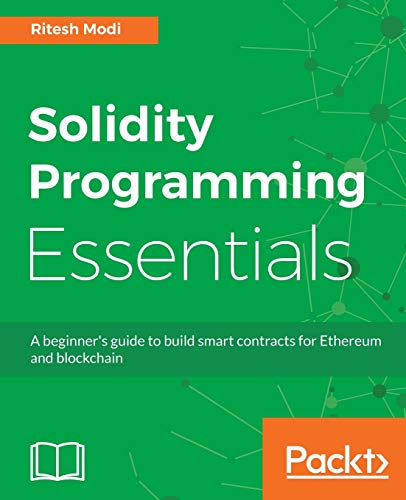Solidity Programming Essentials: A beginner's guide to build smart contracts for Ethereum and Blockchain
Modi, Ritesh
From
BOOK2BUY, Lynbrook, NY, U.S.A.
Seller rating 5 out of 5 stars
![]()
AbeBooks Seller since January 2, 2008
About this Item
Description:
Paperback - clean, clean cover, no marks - from private collection -. Seller Inventory # 39547.240916
Synopsis:
Learn the most powerful and primary programming language for writing smart contracts and find out how to write, deploy, and test smart contracts in Ethereum.
Key Features:
- Get you up and running with Solidity Programming language
- Build Ethereum Smart Contracts with Solidity as your scripting language
- Learn to test and deploy the smart contract to your private Blockchain
Book Description:
Solidity is a contract-oriented language whose syntax is highly influenced by JavaScript, and is designed to compile code for the Ethereum Virtual Machine. Solidity Programming Essentials will be your guide to understanding Solidity programming to build smart contracts for Ethereum and blockchain from ground-up.
We begin with a brief run-through of blockchain, Ethereum, and their most important concepts or components. You will learn how to install all the necessary tools to write, test, and debug Solidity contracts on Ethereum. Then, you will explore the layout of a Solidity source file and work with the different data types. The next set of recipes will help you work with operators, control structures, and data structures while building your smart contracts. We take you through function calls, return types, function modifers, and recipes in object-oriented programming with Solidity. Learn all you can on event logging and exception handling, as well as testing and debugging smart contracts.
By the end of this book, you will be able to write, deploy, and test smart contracts in Ethereum. This book will bring forth the essence of writing contracts using Solidity and also help you develop Solidity skills in no time.
What You Will Learn:
- Learn the basics and foundational concepts of Solidity and Ethereum
- Explore the Solidity language and its uniqueness in depth
- Create new accounts and submit transactions to blockchain
- Get to know the complete language in detail to write smart contracts
- Learn about major tools to develop and deploy smart contracts
- Write defensive code using exception handling and error checking
- Understand Truffle basics and the debugging process
Who this book is for:
This book is for anyone who would like to get started with Solidity Programming for developing an Ethereum smart contract. No prior knowledge of EVM is required.
About the Author:
Ritesh Modi is an ex Microsoft senior technology evangelist and Microsoft regional lead. He has worked on Ethereum and Solidity, extensively helping and advising companies. Ritesh is a regular speaker on blockchain and Solidity at conferences and local meetups. He is an architect, evangelist, speaker, and a known leader for his contributions toward blockchain, data centers, Azure Bots, cognitive services, DevOps, Artificial Intelligence, and automation. He is the author of five books.
Bibliographic Details
Title: Solidity Programming Essentials: A ...
Publisher: Packt Publishing
Publication Date: 2018
Binding: Paperback
Condition: Good
Top Search Results from the AbeBooks Marketplace
Solidity Programming Essentials: A beginner's guide to build smart contracts for Ethereum and blockchain
Seller: HPB-Red, Dallas, TX, U.S.A.
Paperback. Condition: Good. Connecting readers with great books since 1972! Used textbooks may not include companion materials such as access codes, etc. May have some wear or writing/highlighting. We ship orders daily and Customer Service is our top priority! Seller Inventory # S_359306816
Quantity: 1 available
Solidity Programming Essentials: A beginner's guide to build smart contracts for Ethereum and blockchain
Seller: Zoom Books Company, Lynden, WA, U.S.A.
Condition: very_good. Book is in very good condition and may include minimal underlining highlighting. The book can also include "From the library of" labels. May not contain miscellaneous items toys, dvds, etc. . We offer 100% money back guarantee and 24 7 customer service. Seller Inventory # ZBV.1788831381.VG
Quantity: 1 available
Solidity Programming Essentials: A beginner's guide to build smart contracts for Ethereum and blockchain
Seller: Royal Oak Bookshop, Front Royal, VA, U.S.A.
paperback. Condition: Very Good. Brick and mortar bookshop since 1975!Green graphic soft cover, clean unmarked content with tight binding.Brick and mortar bookshop since 1975! Seller Inventory # 250218001
Quantity: 1 available
Solidity Programming Essentials: A beginner's guide to build smart contracts for Ethereum and blockchain
Seller: GoldBooks, Denver, CO, U.S.A.
Paperback. Condition: new. New Copy. Customer Service Guaranteed. Seller Inventory # 8T67_93_1788831381
Quantity: 1 available
Solidity Programming Essentials: A beginner's guide to build smart contracts for Ethereum and blockchain
Seller: Lucky's Textbooks, Dallas, TX, U.S.A.
Condition: New. Seller Inventory # ABLIING23Mar2912160182267
Quantity: Over 20 available
Solidity Programming Essentials
Seller: GreatBookPrices, Columbia, MD, U.S.A.
Condition: New. Seller Inventory # 32730430-n
Quantity: Over 20 available
Solidity Programming Essentials: A beginner's guide to build smart contracts for Ethereum and blockchain
Seller: Chiron Media, Wallingford, United Kingdom
PF. Condition: New. Seller Inventory # 6666-IUK-9781788831383
Quantity: 10 available
Solidity Programming Essentials (Paperback or Softback)
Seller: BargainBookStores, Grand Rapids, MI, U.S.A.
Paperback or Softback. Condition: New. Solidity Programming Essentials 0.86. Book. Seller Inventory # BBS-9781788831383
Quantity: 5 available
Solidity Programming Essentials
Seller: GreatBookPrices, Columbia, MD, U.S.A.
Condition: As New. Unread book in perfect condition. Seller Inventory # 32730430
Quantity: Over 20 available
Solidity Programming Essentials
Seller: GreatBookPricesUK, Woodford Green, United Kingdom
Condition: New. Seller Inventory # 32730430-n
Quantity: Over 20 available

